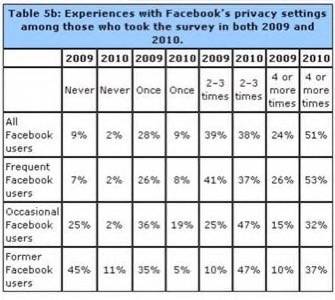Over the past year, Facebook and privacy are two topics that have become practically joined at the hip. The site has changed its privacy settings again and again and last winter CEO Mark Zuckerberg declared the death of privacy. One of the leading arguments behind all of this has been that we live in a new era, beyond the “age of privacy”, and the new social norm for the next generation is to share, freely and without regard for such antiquated concerns as privacy.

New research released today from Eszter Hargittai and danah boyd shows that instead of disregarding privacy, youth have increasingly modified their privacy settings on Facebook over the last year. The age of privacy over, indeed.
The paper, titled “Facebook Privacy Settings: Who Cares?“, examines “the attitudes and practices of a cohort of 18- and 19-year-olds surveyed in 2009 and again in 2010 about Facebook’s privacy settings”. From the abstract:
Our results challenge widespread assumptions that youth do not care about and are not engaged with navigating privacy. We find that, while not universal, modifications to privacy settings have increased during a year in which Facebook’s approach to privacy was hotly contested. We also find that both frequency and type of Facebook use as well as Internet skill are correlated with making modifications to privacy settings.
The research finds that “most” Facebook users modified their privacy settings at least once in 2009, with this practice only becoming more common as time went on, increasing for both frequent and less frequent users. “This suggests that either Facebook’s changes to the site or the public discussion about them that took place between 2009 and 2010 — or a combination of the two — may have influenced people’s practices,” reads the report.
One table in the report helps illustrate how privacy has increasingly become a concern of users, even the 18- and 19-year-olds the research focuses on. The table shows how, over the past year, the number of users modifying their privacy settings has increased dramatically. The most interesting changes come in the first and last columns, with the number of users who had never changed their settings dropping to almost none and the number of users who changed their settings four or more times nearly doubling for all current Facebook users.

In addition to looking at how often respondents altered their Facebook privacy settings, the report also examines their confidence in doing so. The researchers asked respondents to rate, on a scale from one to five, their confidence level performing a number of online tasks, from changing their privacy settings, to posting a comment on a blog, to uploading a video to a site such as YouTube. Surprisingly, the changing of Facebook privacy settings beat out every other of nine online activities.
In the end, boyd and Hargittai paint a picture of a generation of users that not only care about their privacy, but take steps to ensure it.
Overall, our data show that far from being nonchalant and unconcerned about privacy matters, the majority of young adult users of Facebook are engaged with managing their privacy settings on the site at least to some extent. The frequency with which they adjust their settings and their confidence in doing so may vary, but most report modifying their settings.
If actions speak louder than words, it certainly doesn’t look like the age of privacy has ended. Only that small percentage that didn’t modify their privacy settings seem to be agreeing with the idea of broadcasting their information to the world. The rest, it would seem, still like to keep some things private.
There goes that argument, huh?
















